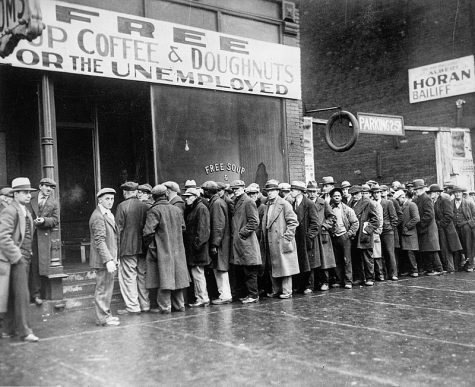The American Dream
What the heck happened to class mobility?
Dominique James, CC BY 2.0
Once a symbol for economic freedom, Lady Liberty watches as America’s middle class is slowly destroyed.
On Tuesday the 24th, General Electric boss John Slattery announced that there would be more job cuts to follow the 13 thousand already laid off this year due to slower profits. These lay off’s represent a larger trend of financialization, and consequently; a stark economic divide in our country.

The main reason massive layoffs are becoming increasingly common in America is because of a phenomenon called “financialization,” which is the increase in size and importance of the financial sector. This increase has come at the cost of our manufacturing sector, and the implications of that have caused many large companies to terminate thousands of jobs on the assembly line. But how did we get to this point?
Because, back in the 1950s, the majority of America’s economy was in the manufacturing sector. This meant that there were millions of jobs on the assembly line, and because these jobs were in such high demand, the workers made good money. This wasn’t surprising either, as these factory workers were quite literally the backbone of our economy, and if they didn’t produce, the economy suffered immensely.
But Because of financialization, the biggest opportunity for a company to make money no longer requires an assembly line. Today, the biggest chance to make a profit is in the financial sector, making factory workers almost obsolete. Now, companies don’t actually need to hire thousands of workers, because these workers just aren’t the ones who will make the company money. In fact, workers are even considered a nuisance now due to financialization, causing many companies to scrap thousands of jobs, because; a handful of investors can easily make more money.
What about GE? They led the country in the manufacturing of electronic goods back in the ’50s and ’60s, and to put it simply, the company prospered as well as the thousands of workers they employed.

But if you look at GE today however, you’ll see a much different story. You’ll see that they now make a majority of their earnings in the financial sector, moving money through various stocks and investments. Now, GE won’t ‘waste time‘ worrying about the few assembly line workers they haven’t laid off yet, they’ll just make sure their handful of investors are still making money for the company, and these recent layoffs have only proved this point. The fact that GE terminated thousands of jobs and the livelihoods of countless families, while shareholders see stock returns increase by 50% according to Goldman Sach’s, shows how much financialization has divided this country. What’s even more frightening is the average CEO’s salary has grown 940% since 1978, while typical worker compensation has risen only 12%according to the institute for economic policy.
In short, financialization has caused the rich to get richer, while blue-collared America has been left behind. These GE layoffs are just some of the hundreds of layoffs in the manufacturing sector has seen over the past decade, and I’m sure there are hundreds more yet to come. But what can we do to bridge this economic divide? Universal Basic Incomes? Force companies to stay in America? Both? It’s hard to find a solution to a problem like this, but one thing is for sure; the longer we wait, the more people will suffer.




